Enab Baladi – Saleh Malas
Inside the Higher Regional Court in Koblenz city, southwest Germany, dozens of victims of torture stories that took place in the Syrian regime’s notorious Branch 251, also known as al-Khatib Branch, gathered over a year and half of the trial of ex Syrian intelligence officer, Anwar Raslan, to recount their painful experiences during the hearings of the first-ever criminal case raised against a member of the regime’s intelligence services.
On 13 January, the Koblenz court sentenced Anwar Raslan, 58, to life in prison (he will be eligible for parole in 15 years). Over the course of the trial, several witnesses or victims came forward and presented their testimonies which revealed an enormous amount of torture that was happening inside Branch 251, following arbitrary arrests by the regime’s security forces.
Raslan was convicted of complicity in crimes against humanity, including torture, 27 murders, and 25 cases of dangerous bodily harm and sexual assault (this judgment could be appealed).
The same court in Koblenz convicted in a world first, former junior intelligence officer Eyad al-Gharib (45 years) on 24 February 2021 and sentenced him to four years and a half in prison for aiding and abetting crimes against humanity.
In this lengthy article, Enab Baladi presents the views of several Syrian legal experts and Koblenz trial insiders, in addition to activists working with communities of survivors of the Syrian regime’s detention centers, on the verdict against Anwar Raslan and its impact on future efforts towards Syrian justice.
An inspiring experience to improve efforts
The verdict against Anwar Raslan is morally and ethically important, for it is the first to be issued against a perpetrator of human rights gross violations in Syria since its independence to this date, despite Syria’s long history of successive atrocities, Hussam al-Qatlabi, a Syrian human rights defender and human rights violations archivist, told Enab Baladi.
However, the gravity of Raslan’s crimes diminishes the importance of the verdict that is in no way part of a comprehensive justice strategy and does not promise greater accountability for the Syrian regime or its officials, al-Qatlabi said.
He added that Syrians’ role in achieving justice and incriminating human rights offenders is limited to presenting testimonies as victims, while decisions in such cases are in the hands of international organizations and the German political authority.
At least 17 victims have joined the Anwar Raslan trial as “joint plaintiffs.” This group and its lawyers have the right to attend the trial, demand information on court proceedings, give testimonies, access legal files, request the admission of additional evidence, and forward questions to witnesses and experts.
According to al-Qatlabi, the sentencing of Raslan is a “broad rubric for the failure of international justice in regard to the Syrian file, by providing quick and piecemeal alternatives of such a kind.” It is also part of a “process and pattern to bring Syrian fugitives and defectors to accountability under different labeling of Syria’s criminal system and structure.”
In this context, the verdict against Raslan is the “epitome of incompetence within the world’s criminal justice system instead of being a victory,” al-Qatlabi said.
Information and data on human rights violations in Syria have failed to advance international efforts towards justice for past and current international crimes, as Syria is not a state party to the Rome Statute, the treaty establishing the International Criminal Court (ICC).
The refusal of the Syrian government of the ICC’s jurisdiction to look into war crimes committed during the last decade in Syria means that the prosecutor of this court will have to refer the situation in Syria to the ICC by a decision from the Security Council to open an investigation there.
In 2014, Russia and China vetoed a United Nations Security Council (UNSC)’s resolution that would have referred the conflict in Syria to the ICC’s jurisdiction, preventing any steps towards accountability for Syrian regime officials inside or outside Syria, which contributed to further grave violations.
As the course of international justice for victims of human rights violations in Syria was disrupted, Syrian and European legal centers have sought to investigate and prosecute perpetrators of such violations to achieve fractions of justice through filing cases to European domestic courts.
According to al-Qatlabi, the course and developments of Anwar Raslan’s trial could be of great importance only if they were assessed thoroughly to draw lessons and be used as a model towards a more developed strategy to address the justice file in Syria.
Moreover, the importance of the verdict against Raslan depends on the proper reading of court proceedings and witnesses’ testimonies, the role of international organizations and their political agendas and influence, and the various parties that invest in such a course politically, diplomatically, and financially, al-Qatlabi added.
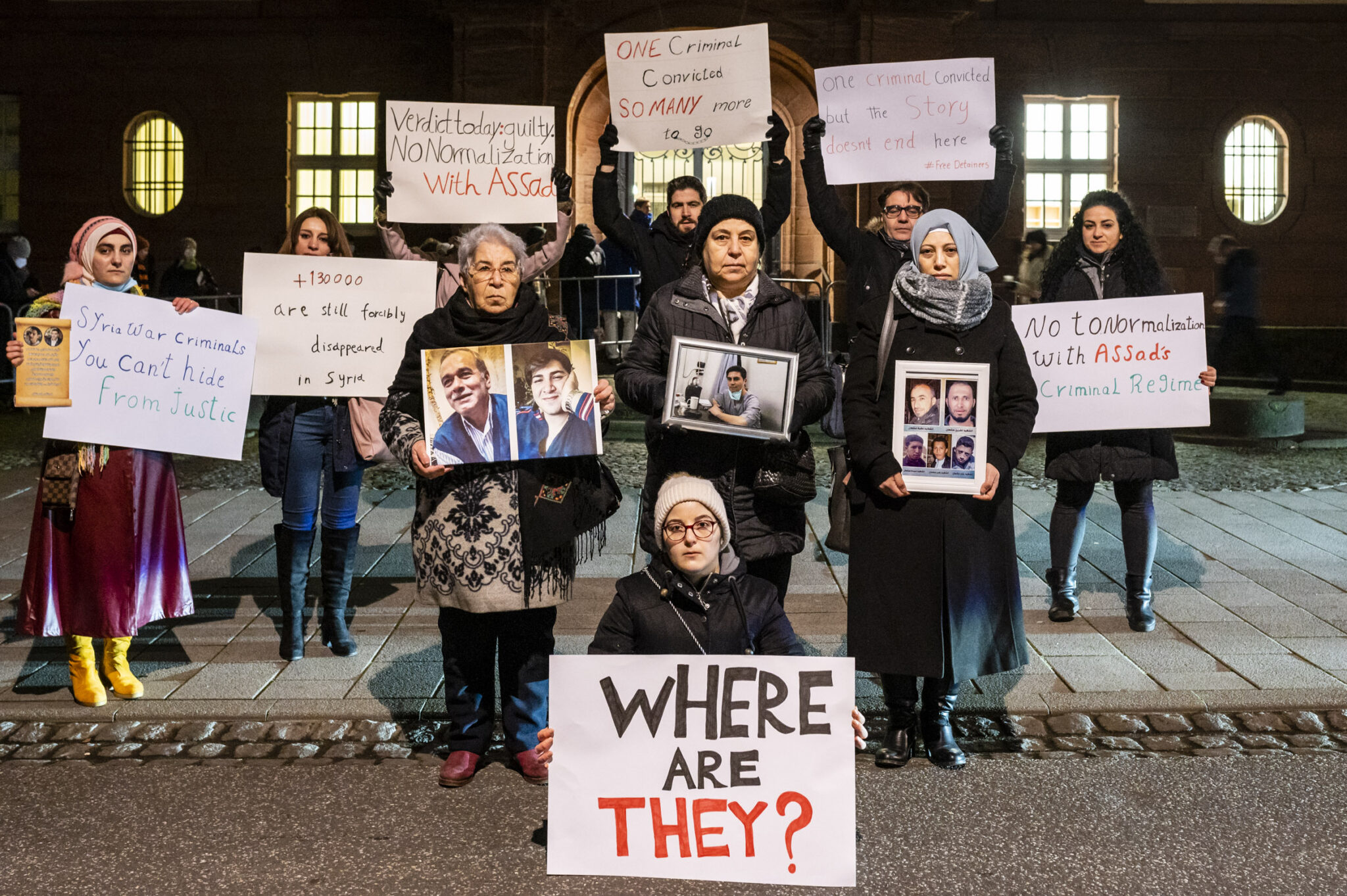
Syrian activists and family members of torture victims in Syrian prisons standing in front of the High Regional Court in Koblenz city, demanding to know the fate of Syrian detainees and the forcibly disappeared – 13 January 2022 (Adopt a Revolution)
Serving justice away from private interests
The Koblenz trial is a “good model to measure the level of free debate,” according to al-Qatlabi.
He added that criticizing justice courses related to the fate of the rights of hundreds of thousands of victims is a necessity in any future judicial process, “without the need to draw swords or use violent language under broad rubrics and preconceived taboos that no sound is louder than that of the battle.”
Justice must not be exploited for private interests away from its principles and provisions, al-Qatlabi noted, adding that for justice to take its proper course, there must be a climate and a space for free debates, which “was never available throughout the Koblenz trial.”
During the trial of Anwar Raslan, things did not go as hoped, with shortcomings in several aspects, including conflicting testimonies on Raslan’s role in human rights violations committed in Branch 251, while he was the head of the investigations section from January 2011 until September 2012.
|
Under the German Code of Crimes against International Law (CCAIL), German authorities can investigate and prosecute grave international crimes even if they were committed abroad and bear no relation to Germany. In such cases, investigations can be carried out even if offenders were anywhere in the world. The German Federal Prosecution Authority and Federal Criminal Police Office are responsible for investigating and prosecuting serious crimes under the CCAIL. |
A public display of torture in Syrian prisons
The Syrian regime does not acknowledge torture in its detention centers and denies the ‘Caesar’ torture photos smuggled out of Syria by a dissident military photographer, which became the most prominent evidence in Anwar Raslan’s trial.
As for victims killed in the Syrian regime’s prisons, their cause of death is usually recorded as a heart attack or respiratory failure, while their bodies are photographed and numbered as part of a documentation process. This subsequently led to the smuggling of 55,000 images of bodies of detainees killed in the regime’s detention centers.
In cases of homicides under torture, the detainee’s family may or may not receive a death certificate, and most victims’ families did not receive the bodies of their detained family members. Sometimes, they were forced to sign a certificate that the “armed groups” killed their son or daughter to be allowed to receive their body back.
This is the systematic methodology through which the Syrian regime justifies the detainees’ deaths, causing people to circulate stories and talk about torture forms inflicted on detainees in the regime’s prisons.
However, the conviction of Anwar Raslan of 4,000 cases of torture inside Branch 251 by a German judicial ruling is a test to the seriousness of evidence Syrians have within the detainees’ file and their role in future trials, the Executive Director of the Syrian Justice and Accountability Center (SJAC), Mohammad al-Abdullah, told Enab Baladi.
The Koblenz trial provided space for recounting collective and public experiences of victims and survivors from Syrian prisons, al-Abdullah said, adding that these experiences or testimonies were heard by German judges and shared by Arab and international media, making the trial a landmark in Syrian history.
Moreover, testimonies before the judges of the Koblenz court depicted daily life details and torture forms inside Branch 251 and helped explain what caused the gruesome brutality shown in the Caesar photos.
The amplification of Koblenz trial’s impact is against victims’ interests
Despite the importance of the Anwar Raslan trial, amplifying its impact through social media and the media would not serve the victims, according to al-Abdullah. The international community may come to believe that “justice has been served to Syrians,” encouraging some European Union countries to deport Syrian refugees and re-establish relations with the Syrian regime.
According to the International, Impartial, and Independent Mechanism for Syria (IIIM), the number of people who have disappeared since the beginning of the conflict in Syria is estimated at over 100,000 persons. However, the accuracy of this number cannot be verified.
The Syrian regime uses enforced disappearance as a form of punishment and retaliation that can affect relatives of persons wanted for security apparatuses or security and military elements who refuse to shoot civilian demonstrators. At the same time, the regime’s government refuses to reveal the fate of the detainees or acknowledge their detention in the first place.
The Koblenz court ignored legal demands to include enforced disappearance as an additional crime against Anwar Raslan. In 2021, several Syrian activists and human rights organizations called for the inclusion of this charge in the indictment list against Raslan, based on a belief in an organic link between arbitrary detention and enforced disappearance in all Syrian regime’s detention centers, including Branch 251.
The inclusion of enforced disappearance to the indictment list against Raslan would have strengthened the testimonies of victims and survivors who said that many of those detained by the regime are now unaccounted for, thus pushing the European jurisdiction to investigate the fate of these persons with the aim of highlighting this crime and its outcomes.
The United Nations General Assembly (UNGA) confirmed in its resolution issued on 10 November 2021 the widespread practice of enforced disappearance in detention centers referred to in the reports of the Independent International Commission of Inquiry on Syria (IICISyria), including, but not limited to, Branch 215, Branch 227, Branch 235, Branch 251, and the Air Force Intelligence Investigation Branch at Mezzeh military airport and Sednaya prison.
A landmark ruling against sexual assaults in regime’s detention centers
Ahmad Helmi, the co-founder and program manager of Ta’afi Initiative, told Enab Baladi that the importance of the Koblenz trial’s verdict does not come from the significance of the convicted, his former position or military rank, or the nature of the verdict given to him, but it lies in challenging the notion of impunity that all Syrian security institutions work under.
A landmark ruling also convicted Raslan of general assaults against detainees in Branch 251, including sexual violence and abuse. However, such assaults did not receive much attention due to the stigma that victims of sexual assaults face after their release from detention centers, particularly if they were women, Helmi said.
Sexual assaults are a constant in the regime’s detention centers and range between rape, sexual penetration using foreign objects, prolonged forced nudity, sexual groping, and beatings on the genitals.
Syrian female detainees have been subject to sexual assaults in Syrian regime detention centers. Such violations constitute a war crime at any time and amount to a crime against humanity in the context of a widespread and systematic attack against civilians.
In some cases, detained girls as young as 13 were sexually assaulted by prison guards and security forces, according to the ninth report of the IICISyria.
Helmi said that the “Koblenz court ruling based on victims and survivors’ torture testimonies will provide the basis for future trials.”
“European courts will not bring justice to Syrians, but this ruling has won them a small victory at the legal level and constitutes a small step on the road to justice,” Helmi added.
Among the crimes against humanity provided for in Article VII of the Rome Statute are the crimes of extermination, enforced disappearance of persons, enslavement, deportation or forcible transfer of population, imprisonment or other severe deprivation of physical liberty, torture, rape, sexual slavery, enforced prostitution, forced pregnancy, enforced sterilization, or any other form of sexual violence of comparable gravity.
|
The Koblenz trial against Anwar Raslan was based on the principle of universal jurisdiction, which refers to legal frameworks that allow national judicial systems to investigate and prosecute certain crimes, even if they were not committed by one of their nationals on their territory or against one of their nationals. Some European countries, including Germany, France, and Sweden, use universal jurisdiction laws to investigate allegations of serious crimes committed in Syria. In principle, justice is best served in countries where crimes are committed, but this is not possible in many cases. The concept of universal jurisdiction weakens the notion of a safe haven that may enable perpetrators of serious crimes to escape punishment. This principle makes a solid reference to the nature and gravity of crimes against humanity and war crimes. |
“Missed opportunities”
In an article published by Amnesty International under the title “Reflections on the Syrian Torture Trial in Koblenz,” Syrian journalist and human rights defender Mansour al-Omari said, “Sentencing the perpetrator and compensating the victims are two primary outcomes expected of legal proceedings in justice systems worldwide. Court proceedings themselves are also expected to be fair to the victim communities.”
“However, I can’t say this was the case in the Koblenz trial,” al-Omari said, adding “The court sentenced Raslan but did not compensate his victims and the international law includes clear legal obligations that states must act accordingly with the duty of reparations for victims of human rights violations.”
“The compensation that the plaintiffs in the Koblenz trial missed out on includes lost opportunities, including employment and education and material damages and loss of earnings, including loss of earning potential,” according to al-Omari.
“There should also be compensation for physical or mental harm. Costs required for legal or expert assistance, medicine and medical services, and psychological and social services are essential parts of reparations, as well as an official declaration or a judicial decision restoring the dignity, the reputation, and the rights of the victim and persons closely connected with the victim; and public apology, including acknowledgment of the facts and acceptance of responsibility,” al-Omari added.
“Still, the trial showed the importance of documentation efforts, victim participation, and non-Syrian partners’ efforts, such as strategy workshops, information sharing, and funding justice initiatives,” al-Omari said.
He added, “For many Syrians, especially victims of torture, the trial has had a significant symbolic and emotional impact.”
Exploiting the trial
Diab Sariya, co-founder and coordinator of the Association of Detainees and the Missing in Sednaya Prison (ADMSP), told Enab Baladi that he is content with the course of the Koblenz trial and its verdict against Anwar Raslan but thinks that its impact was exaggerated.
Sariya added that the amplification of the case and the description of the trial as a “gate to achieve justice to survivors and to all Syrians” has harmed victims and the court alike.
He added, “Some figures tried to exploit the trial and the victims for personal gains, seeking fame not justice.”
According to Sariya, Syrian and international human rights organizations were not up to the responsibility within the trial’s complex course. They did not adequately address victim communities and did not control people’s expectations in proportion to the weight of evidence, nor did they realize the importance of this issue.
Statements released by some human rights defenders and organizations following Anwar Raslan’s trial were irresponsible, as they raised the public’s expectations in an exaggerated way, which reflected negatively on the survivors and left them unsure how to judge the trial’s outcomes.
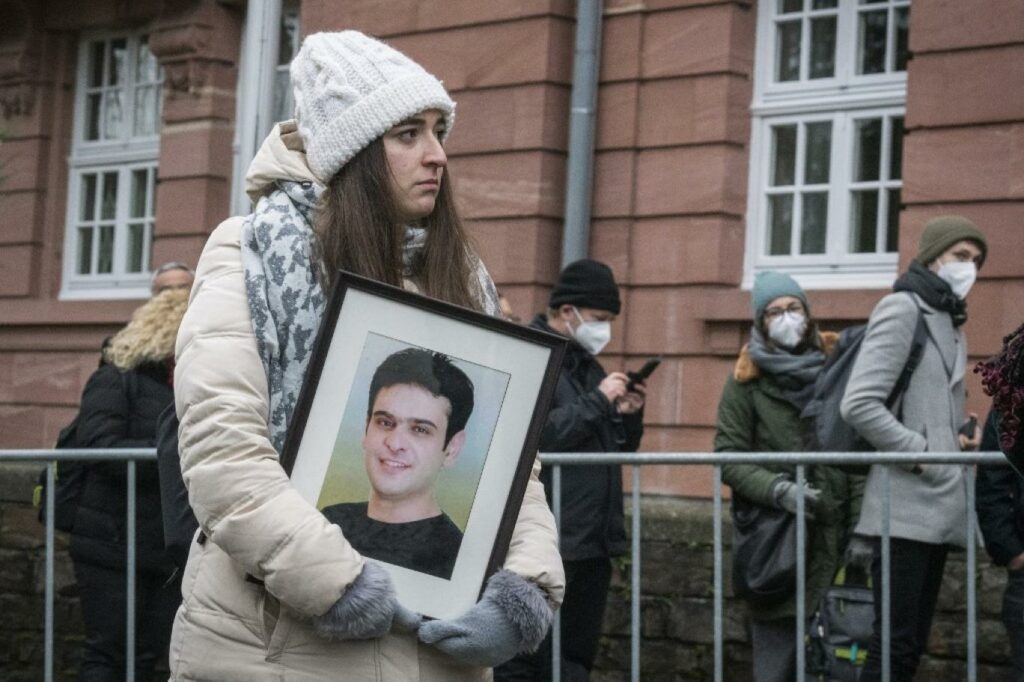
Syrian activist Sama Mahmoud carrying a picture of her uncle, Hayyan Mahmoud, who is detained in the Syrian regime’s prisons, in front of the Koblenz court in wait for the verdict against Anwar Raslan – 13 January 2022 (AFP)
Putting the Koblenz trial model to the test
Discussing the trial’s results is a must
“The al-Khatib Branch still exists, and there are people who are currently being tortured there. Anwar’s role was limited to his working period in the branch, and this trial was to prosecute him, not the al-Khatib Branch. The branch still contains detainees, as do all security branches in Syria; therefore, the verdict presents little justice to some Syrians, and this is what the court can offer to them,” Sariya said.
Aside from any tensions that occurred during the Koblenz trial, there should be thorough and comprehensive discussions on this trial by Syrian legal experts involved in the case.
Sariya added that the most important discussion must be on how Anwar Raslan arrived in Germany on a visa from the Jordanian capital of Amman, with a recommendation from the prominent Syrian opposition figure Riad Seif, without difficulty to anyone.
Questions must be raised on how he became a security adviser to the Syrian Negotiating Commission (SNC) and his presence among the opposition’s side during the Geneva II Conference on Syria in 2014.
Koblenz trial in its proper context
Over the course of his trial, Anwar Raslan denied all charges directed at him.
During the trial’s 2020 hearings, Syrian businessman and political opponent, Riad Seif, testified before the court that he had helped Raslan to enter Germany in 2014 on a visa issued by the German Embassy in the Jordanian capital of Amman by sending documents related to his asylum application to the German Foreign Office in Berlin.
Seif said that he supported Raslan’s defection in the hope of obtaining valuable information regarding the fate of other political opponents detained in Branch 251; however, Raslan refrained from revealing any information.
“We got nothing from Anwar Raslan, no word or information,” Seif revealed in his testimony.
In June 2012, Seif decided to leave Syria to the German capital of Berlin, where he still lives to this day.
In Germany, Seif’s son-in-law asked for support for Syrian intelligence officers wishing to defect from the Syrian regime, and shortly after, the name of former intelligence officer Anwar Raslan was first heard in August 2013.
The trial of Anwar Raslan was not based on personal reasons related to his failure to cooperate with the Syrian opposition in the context of “settling scores,” but rather “within a specific context of serving justice to victims of violations in al-Khatib Branch after a long period of gathering and examining evidence,” Joumana Seif, a Syrian lawyer and fellow researcher in the International Crimes and Accountability Program at the European Center for Constitutional and Human Rights (ECCHR), told Enab Baladi.
The ECCHR is part of the prosecution team against Anwar Raslan and Eyad al-Gharib.
Raslan did not share the information he had about torture practices in Branch 251, even though he defected from the Syrian regime and joined the opposition side. Thus, the mere defection must not be viewed as a reason to acquit him from the crimes he committed before his defection.
According to Seif, the verdict against Anwar Raslan creates a solid basis for European prosecutors to pursue further proceedings associated with the prosecution of human rights violations in Syria.
Seif added that the trial’s problematic aspects would be studied to ensure they would not occur in future trials.
The ECCHR monitors war crimes and crimes against humanity in several countries, including Syria, under the competence of its legal work.
As for the conflicting testimonies of some witnesses, Seif said that the judge is not bound to consider them or be guided by them, as similar testimonies were not taken into account during the determination of the verdict, while other testimonies were removed and ignored by the court.
Enab Baladi contacted the Executive Director of the Syrian Center for Legal Studies and Research, lawyer Anwar al-Bunni, and asked his opinion on the verdict against Anwar Raslan, given that al-Bunni was one of the plaintiffs’ lawyers at the trial.
Al-Bunni did not answer Enab Baladi’s questions, but he talked to the al-Hurra news website on 13 January, describing the verdict as “historic,” adding, “It is a victory for justice as a principle. A victory away from political interference. The victims created their own justice.”
Al-Hurra cited al-Bunni as saying that Raslan’s conviction is “a conviction to the entire criminal system in Syria. Raslan is part of a systematic system for killing, torturing, and arresting Syrians and engaging in sexual violence against them.”
On 18 November 2021, the Koblenz trial rejected the motion of Anwar Raslan’s defense team to summon lawyer Anwar al-Bunni to testify about “conflicting testimonies” of witnesses he presented to the court.
The defense team suggested to the court to call al-Bunni for testimony to investigate his relation to witnesses and the possibility of al-Bunni dictating their testimonies.
The Syrian regime’s continued use of excessive force to suppress peaceful demonstrations in 2011 has led to an increase in human rights violations and armed violence over a decade in Syria.
The commission of serious crimes was no longer limited to the regime’s forces, as other internal and external parties have become involved in those widespread abuses that affected most Syrians. Every man, woman, or child has a tragic story they share with other victims of the Syrian conflict: the loss of relatives, loss of property, loss of rights, loss of hope, and to some, the loss of everything.
The most notable feature of transitional justice sought in Syria is the prosecution of those who bear the greatest responsibility for the most serious crimes or may bear direct individual responsibility for them.
Judicial or non-judicial mechanisms rely on the investigation and documentation of crimes and violations that took place in Syria after 2011 through fact-finding, compensation, and investigation. This task is the responsibility of Syrian activists, journalists, civil society organizations, particularly those defending human rights victims and policymakers.
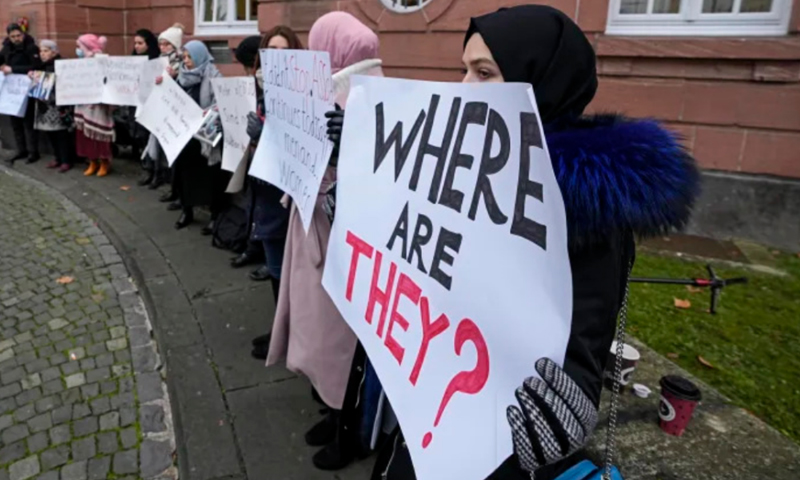
Syrian activists and family members of torture victims in the Syrian regime’s detention centers standing in front of the High Regional Court in Koblenz city, demanding to know the fate of detainees and forcibly disappeared – 13 January 2022 (AFP)
if you think the article contain wrong information or you have additional details Send Correction
النسخة العربية من المقال
-
Follow us :



















 A
A
A
A
A
A
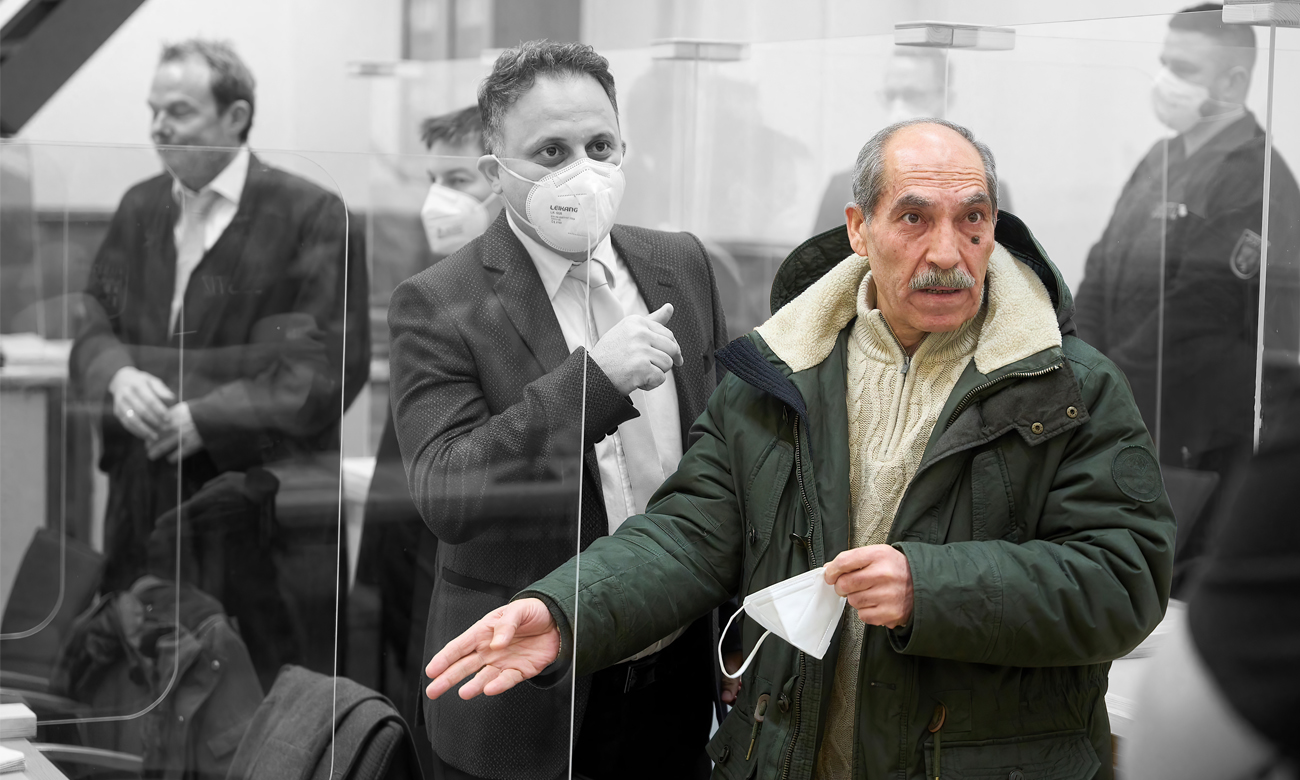




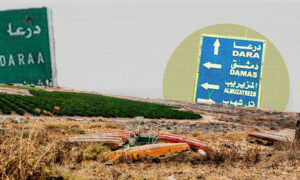
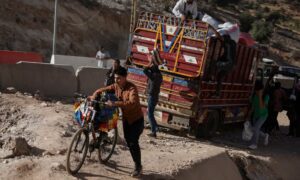


 More In-Depth
More In-Depth